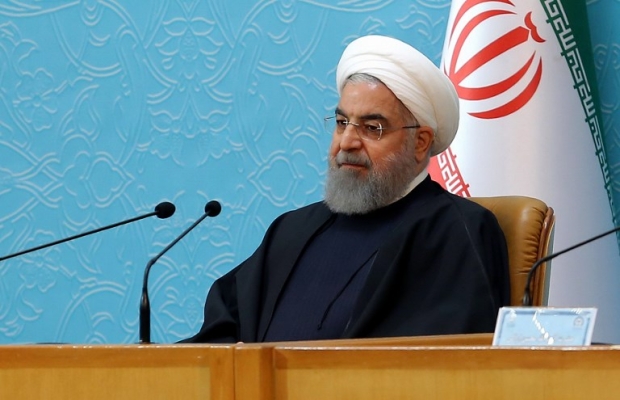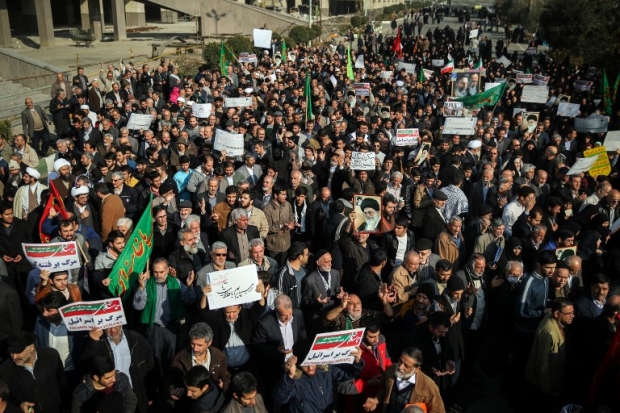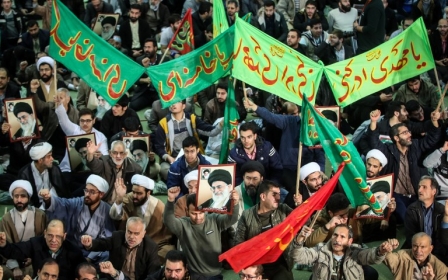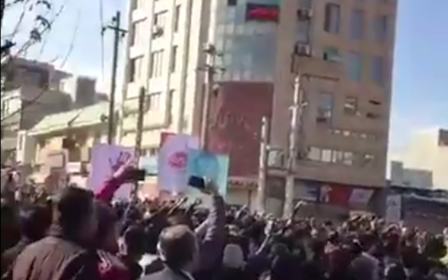Will the Iranian protests lead to a popular uprising?
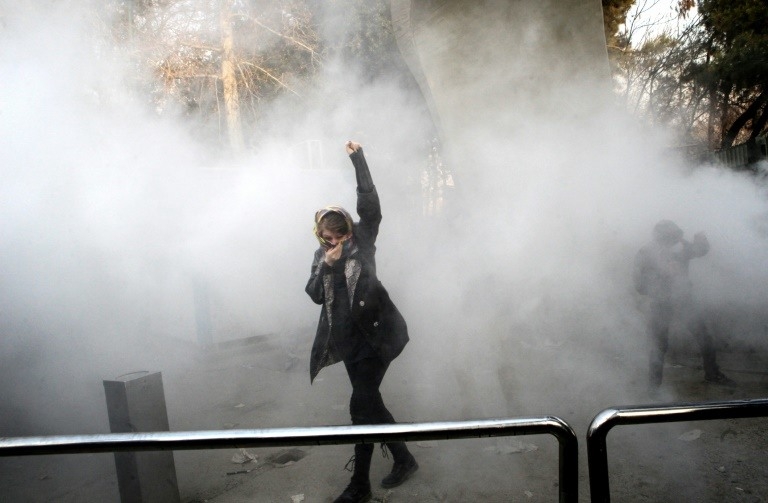
Street protests in Iran under the banner of "No to High Prices" erupted on 28 December in the holy city of Mashhad, the country's second-largest city. The following day, the protests spread to several additional cities, including Qom, home to the largest centre for Shia scholarship and seminaries in the world.
Demonstrators ignored a warning by Iran's interior minister to avoid "illegal gatherings". The protesters set a police car on fire in Mashhad on the night of 30 December.
Why Mashhad?
That the dominant slogan chanted by the Mashhad demonstrators in the early hours was "Death to Rouhani" - referring to the Iranian centrist president - raises the suspicion that the protests were orchestrated by hardliners to undermine Hassan Rouhani and his administration.
Mashhad is where Ebrahim Raisi, the hardliner candidate who was defeated by Rouhani in last May's presidential elections, is headquartered as the custodian of the holy shrine of Imam Reza, the eighth Imam of the Shia Twelvers.
Mashhad is also home to Ayatollah Ahmad Alamolhoda, Raisi's father-in-law and the city's Friday prayer leader, who is one of Rouhani's fiercest opponents. In the May election, Raisi attracted 903,000 votes in Mashhad, versus Rouhani's 688,000.
This imbalance resulted in Mashhad being the only large city that voted for Raisi.
In a statement, Vice President Eshaq Jahangiri alluded to the likelihood of the protests being launched and organized by the hardliners in an effort to bring down Rouhani, saying: "The ones who trigger political moves in the streets may not be the ones who will put an end to it, since others may ride the wave they have started."
Jahangiri's remark proved prescient. The anti-Rouhani slogans were quickly taken over and dominated by others, such as "Death to the dictator," "You are using religion as a ladder, you have ruined people," "Leave Syria alone, do something for us," "The Islamic Republic we don't want, we don't want" and "The nation is struggling in poverty, the leader is acting as God".
But what was completely unprecedented – and never been seen in any previous demonstrations since the Iranian Revolution – were slogans in support of the last royal dynasty, which was toppled by the 1979 revolution, such as: "Reza Shah [referring to the founder of the Pahlavi dynasty], Bless your soul" and "Shahanshah [meaning the king, referring to Mohammad Reza Pahlavi, overthrown in 1979], Bless your soul."
But what was completely unprecedented ... were slogans in support of the last royal dynasty that was toppled by the 1979 revolution
Poverty, unemployment and astronomical corruption
Grievances such as poverty, high unemployment (officially at 12.7 percent), astronomical corruption cases, price increases, fraudulent financial schemes that have resulted in millions of people's savings being erased, and – perhaps worst – the widening gap between the poor and the rich, were reflected in the slogan of "What a mistake we made by taking part in the revolution".
According to a 4 September report by the Revolutionary Guards in their political organ Sobhe Sadeq titled "People's livelihoods is the Leader's many-years-long concern," half of the Iranian population live under the poverty line and inequity is widening.
It is an open secret that in Iran, where corruption is prevalent, wealth accumulation is primarily realised through patronage, nepotism, cronyism, and rent seeking activities.
While the majority of Iranians suffer economically and some struggle for survival – the walls of Tehran are plastered with ads of people selling their kidneys, for example – the "rich kids of Iran" revel in their glamorous lifestyle. Against this backdrop, the government claims to be revolutionary, seeking to place the Islamic value of ghest (social justice) at the centre of its discourse.
Making matters worse is Rouhani and his team's Pavlovian following of a neoliberal economic system, which brings with it a dogmatic adherence to the spurious idea that economic growth is the remedy to all ills of society and that the wealth of the rich "trickles down" to the poor.
In August, Rouhani's minister of intelligence, cleric Mahmood Alavi, said to businessmen: "I kiss your hands. ... If any of my colleagues get close to arresting a [largely] economically active person, that would be the end of his career."
In an unheard of statement by an official in the Islamic Republic, Alavi continued by saying: "Just because your generosity reaches our society and our youth, we send you our prayers and do our best to protect your security and your reputation."
The opponents of the moderates and reformists, ie the conservatives, are no better in this respect. They simply use populist rhetoric as a tool to discredit the moderates and have not passed a single piece of legislation to defend those who suffer economically. This despite the fact that conservatives have overwhelmingly been the dominant faction in the parliament.
Will the protests lead to a popular uprising?
Thus far, the protests have failed to transform into mass demonstrations. There are three major reasons why they may not.
First, unlike the 2009 protests of the disputed election of the former eccentric president Mahmoud Ahmadinejad, there is no leadership to mobilise a mass uprising. Indeed, there is neither leadership inside nor outside of Iran opposing the government based on a platform in support of the needy. In the 2009 upheavals, not a single economic demand was brought by the Green Movement.
First, unlike the 2009 protests of the disputed election of the former eccentric president Mahmoud Ahmadinejad, there is no leadership to mobilise a mass uprising
Second, a large number of the middle-class urbanites who took part in the 2009 demonstrations are suspicious about the nature of the current developments. They do not want to fall into the conservatives' trap and be used as a tool to weaken Rouhani in favour of his opponents, whom they wholeheartedly detest. One must not forget that Rouhani won the election primarily as a result of the support of the middle class.
Third, there is confusion as to the basis of the protests. Although the protests began as demonstrations against economic woes, in their continuation the slogans have addressed a myriad of issues ranging from economic to political to anti-clerical and anti-establishment arenas.
That said, as life becomes more arduous for the Iranian people, especially the poor, there likely could be an outbreak of public anger by a new class that has not arisen since the 1979 revolution. That new "movement of the hungry" could endanger the stability of Iran and its establishment.
- Shahir Shahidsaless is an Iranian-Canadian political analyst and freelance journalist writing about Iranian domestic and foreign affairs, the Middle East, and the US foreign policy in the region. He is the co-author of Iran and the United States: An Insider’s View on the Failed Past and the Road to Peace. He is a contributor to several websites with focus on the Middle East as well as the Huffington Post. He also regularly writes for BBC Persian. He tweets @SShahisaless.
The views expressed in this article belong to the author and do not necessarily reflect the editorial policy of Middle East Eye.
Photo: An Iranian woman raises her fist amid the smoke of tear gas at the University of Tehran during a protest driven by anger over economic problems, in the capital Tehran on December 30, 2017.
This article is available in French on Middle East Eye French edition.
New MEE newsletter: Jerusalem Dispatch
Sign up to get the latest insights and analysis on Israel-Palestine, alongside Turkey Unpacked and other MEE newsletters
Middle East Eye delivers independent and unrivalled coverage and analysis of the Middle East, North Africa and beyond. To learn more about republishing this content and the associated fees, please fill out this form. More about MEE can be found here.



